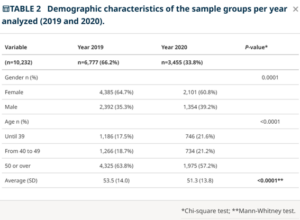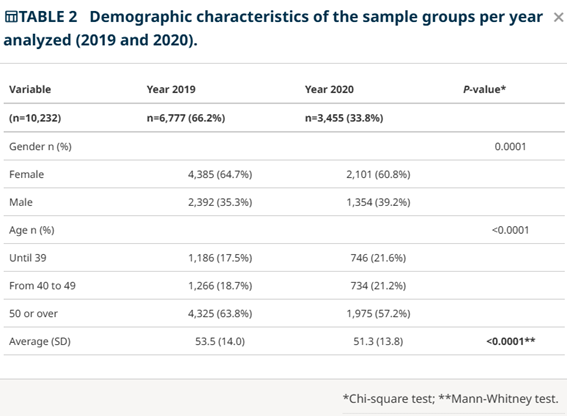HIGHLIGHTS
- The impact of the COVID-19 pandemic on the diagnosis of adenomatous polyps and colorectal cancer.
- A cross-sectional study evaluating COL performed during the periods from 20 March to 31 October of 2019 and of 2020, which analyzed 10,232 colonoscopies.
- There was a 51,0% reduction in the number of COL performed in 2020 when compared to 2019. Of the altered exams, adenomatous polyps were diagnosed in 68.8% in 2019 and 78.3% in 2020. CRC was diagnosed in 0.9% in 2019 and 1.6% in 2020.
ABSTRACT – Background
ABSTRACT
Colorectal cancer (CRC) is globally the third most common malignant neoplasm and the second leading cause of cancer-related death worldwide. The COVID-19 pandemic led to the suspension of routine screening tests by health services. A 35.5% drop in total cancer diagnoses in 2020 is estimated when compared to 2019.
Objective: To evaluate the impact of the COVID-19 pandemic on the diagnosis of adenomatous polyps (AP) and CRC in a population undergoing colonoscopy (COL) in a clinic in Goiânia, Brazil.
Methods: A cross-sectional study evaluating COL performed during the periods from 20 March to 31 October of 2019 and of 2020, was approved by the Research Ethics Committee (CAAE-45631421.0.0000.0037). We analyzed data related to identification, referral for medical examination, colonoscopic and histopathological findings.
Results: We evaluated 10,232 (93.4%) COL, divided into two groups according to the year of performance. In 2019, 6,777 (66.2%) COL were performed and in 2020, 3,455 (33.8%), demonstrating a reduction of 51.0%. A total of 3,267 (31.9%) colonoscopies found polyps, 72.1% of which were AP (68.8% in 2019 and 78.3% in 2020, P<0.001). High-grade dysplasia was found in 5.0% of the AP (4.9% in 2019 and 5.8% in 2020, P<0.34). CRC was diagnosed in 121 (1.2%) (0.9% in 2019 and 1.6% in 2020, P<0.001).
Conclusion: The COVID-19 pandemic significantly reduced COL in 2020, mainly due to infection fears and restrictions. However, the detection rate of cancer and polyps per procedure increased, indicating more symptomatic patients sought medical attention. Despite this, the absolute number of tumors and adenomas found decreased, potentially causing diagnostic losses and fewer prevented colorectal cancer cases. Thus, adaptive strategies are vital for maintaining essential healthcare services during similar crises.
AUTORES
SILVÉRIO, Natália Ribeiro MONTEIRO, Isabela Costa PRUDENTE, Ana Luiza Naves ROSA, Anna Caroliny Navarro SILVÉRIO, Américo de Oliveira



